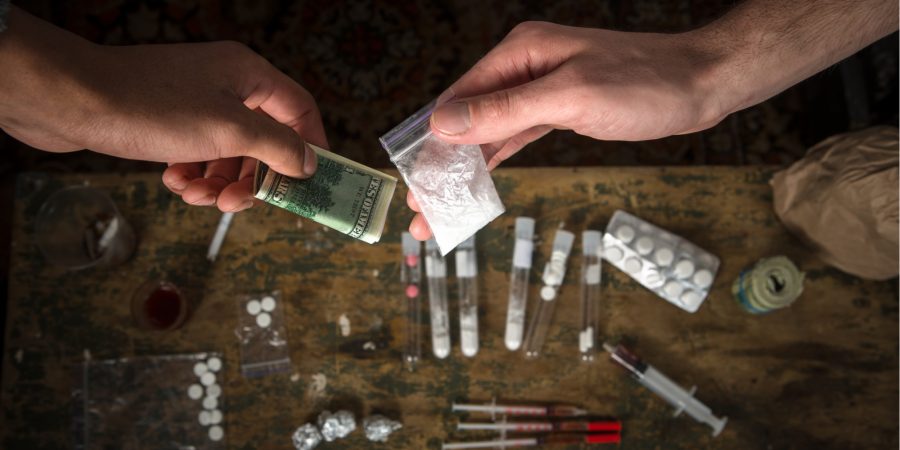
Without a proper detox center, alcohol and drug withdrawal symptoms can make recovery seem impossible. If you’re detoxing from drugs or alcohol, that means that your body has come to rely on these addictive substances. And even if you’re ready to quit, your body can make the recovery process much harder.
Let’s talk about common alcohol and drug withdrawal symptoms and how you can get help in DeLand, Florida. Because withdrawals should never be a barrier between you and recovery.
Table of Contents
Different Types of Drug Withdrawals

Depending on what addictive substance you’ve been using, withdrawals can vary wildly. In fact, some addictive substances have little to no physical withdrawals at all. But for others, drug withdrawal symptoms can be severe and even life-threatening. Some of the addictive substances that lead to significant withdrawal symptoms include:
- Alcohol
- Benzodiazepines
- Opioids
- Amphetamines
- Cocaine
The duration of the withdrawals can vary depending on the substance abused, your age, and genetic factors. In general, however, withdrawals begin within six to twelve hours of the last dose of the substance and last from three to seven days. When in doubt, you should consult with medical staff at an addiction treatment center to determine what you can expect from withdrawals.
These are all how drug withdrawal symptoms work in general, but what can you expect for specific substances?
Alcohol Withdrawal Symptoms
Alcohol is a well-known depressant, which means that it has depressive effects on your body and, subsequently, your mood. When you consume alcohol, brain functions may be impaired, and your nerves can send the wrong signals throughout your body. While this usually does not cause long-term damage, when alcohol is taken for a prolonged period, it becomes much more dangerous. As you consistently use alcohol, your central nervous system learns to adjust to the constant levels of alcohol.
This means your brain works harder to keep itself in an awake, alert state at all times. When this happens and no alcohol is present, you may start to notice withdrawal symptoms caused by this miscommunication in your brain.
Symptoms can include:
- anxiety
- trembling hands
- headache
- nausea and vomiting
- insomnia
- sweating
- seizures
- hallucinations alongside confusion, racing heart, high blood pressure, fever, and heavy sweating
Generally, alcohol withdrawal appears in three stages, each with ascending severity. The first stage begins roughly eight hours after your last drink, and it includes mild symptoms like headaches, stomach pain, and nausea. The second stage usually begins after one day but can take up to three days to start. At this stage, symptoms include elevated blood pressure, body temperature, and respiration, as well as irregular heart rate, mental confusion, sweating, irritability, and emotional disturbances. Finally, the most severe stage, stage three, can cause you to experience hallucinations, fever, and seizures. For most people, symptoms subside within a week, although they can last longer in rare cases.
In order to determine if you need to medically detox from alcohol, detoxification professionals at an addiction treatment center will evaluate how long you’ve been drinking, how much you drink, and your medical history. Alcohol withdrawal can have deadly consequences, so it’s important to seek help before you suddenly stop drinking. But, with professional care and expert treatment, you can get past alcohol withdrawals and start on your recovery.
Benzodiazepine Withdrawal

Benzodiazepines often go by the street name “benzos,” and they’re prescription medications that are routinely used to treat anxiety disorders or post-traumatic stress disorder. However, in most cases, physicians only prescribe these medications for short-term use due to their high risk for addiction. Moreover, the benzodiazepine detox process can be severe, and it may include symptoms like:
- bouts of irritability
- panic and anxiety
- insomnia and low quality sleep
- tremors
- sweating
- headaches
- poor concentration
- sensory distortions
- nausea
- heart palpitations
- high blood pressure
- muscle pain and stiffness
- depression
When you stop using these medications, make sure to admit yourself into a detox program. Withdrawal symptoms often occur 24 to 72 hours of stopping use, and more mild symptoms can last for several weeks or months. However, without professional detoxification, it can be hard to quit benzodiazepines for any period of time.
Stimulant Withdrawals
Remember how we established that alcohol depresses your nervous system? Well, stimulants affect your body in the opposite way. They create a state of heightened focus, alertness, and energy, as well as an increase in heart rate, breathing, and blood pressure.
Stimulants include:
- cocaine
- amphetamines (used to treat attention deficit hyperactivity disorder, or ADHD)
- methamphetamines
Stimulant withdrawal causes symptoms that are the opposite of the stimulant’s effects. Symptoms include:
- depression, lethargy, and low energy
- anxiousness and agitation
- sadness
- intense cravings for the stimulant
- exhaustion, both physical and mental
- insomnia
Although these symptoms aren’t life-threatening, they can still cause extreme discomfort. Most physical symptoms begin within a day of stopping use, while longer-lasting symptoms, such as depression, can last up to five months.
The amount of time your symptoms last depends on the stimulant you have used. For example, depression after cocaine use can fade after a few hours. However, for someone using methamphetamine, these symptoms can last much longer. Furthermore, one of the greatest risks of stimulant withdrawal is suicidal ideation. Because substance abuse and mental health go hand-in-hand, seeking out professional addiction rehabilitation care can be helpful in combatting this risk and getting through the process of detox.
Opioid Withdrawal
Ordinarily, opioids are used to help people dealing with acute or chronic pain. While these painkillers can do a lot of good in the short term, they are generally not recommended for long-term use due to their habit-forming nature. For veterans in particular, opioids are a common gateway to addiction. Common opioids include:
- codeine
- heroin
- hydrocodone (Vicodin)
- hydromorphone (Dilaudid)
- methadone
- meperidine (Demerol)
- morphine
- oxycodone (Percocet or Oxycontin)
According to the National Institute on Drug Abuse, withdrawals from opioids can be both severe and dangerous. For this reason, nobody is advised to detox from opioids at home. Instead, look for a facility that provides medical detox under the supervision of appropriate medical professionals.
Opioid withdrawal symptoms:
Early symptoms
- altered perception of temperature (hot/cold flashes, hot/cold sweats)
- agitation, irritability
- anxiety
- dehydration
- fatigue
- low energy
- muscle aches
- mental fog/confusion/lack of motivation
- increased tearing
- insomnia
- restless legs
- runny nose
- sweating
- yawning
- skin-crawling
- change in libido (abnormally high or low)
Later symptoms
- abdominal cramps
- diarrhea
- dilated pupils
- goosebumps
- nausea
- sneezing
- vomiting
The Benefits of Alcohol and Drug Detox
As you can see, withdrawal symptoms are a lot for anyone to handle alone. And sadly, when people try to quit “cold turkey” at home, it’s a recipe for relapse. This is because symptoms of withdrawals can be deeply uncomfortable or even potentially dangerous. When people are faced with endangering their lives or taking a drug, they often choose the latter, and their attempt at recovery is over before it really begins.
The situation is entirely different with professional detox, however. When you’re monitored 24/7 by detox specialists, you protect both your safety and your recovery. This is because there is no way to access drugs or alcohol at a rehabilitation facility, and the medical staff will ensure that your vitals remain stable and you receive any necessary care to keep you healthy. This also sets you up to graduate from detox and transition to a residential substance abuse treatment program. In this way, you can address both the physical and mental aspects of addiction.
Across the United States, countless veterans relapse due to the side effects of withdrawals. At Heroes’ Mile, we’re working to help military personnel discover a better way to beat alcohol and drug addiction. If you’d like to learn more about our veteran rehabilitation programming, call us at 888-838-6692 or fill out a confidential contact form to submit your questions online. No matter where you’re at in the recovery process, we’re ready and waiting to help.
The post Alcohol and Drug Withdrawal Symptoms Before Detox appeared first on Heroes’ Mile Veterans Recovery Center.
Source
Original Author: Heroes’ Mile

